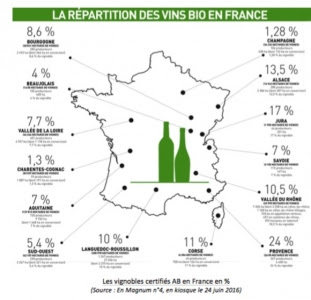By reading my articles, you certainly suspect my point of view on organic wine. However, there are days like today when the news seems bad for organic viticulture.
Thanks to the awareness of consumers and winegrowers, organic wine has gained ground since 5 years. Unfortunately, vineyard areas in organic conversion are decreasing in France. Organic wine therefore continues to progress, but more gently. Have we reached a point of no return ? Will progress slow down further? ?

Organic has seen obvious progress
Since 2010, the conversion of viticulture to organic was completely normal. According to Agnès Boisson, coordinator of the viticulture pole of the organic network of Burgundy, SEDARB, since the "boom of 2010, 2011, we converted to organic a whole category of winegrowers who were ready”. Today, those who were ready to convert have done so and it is the turn of professionals who are more cautious or for whom it is a little more complicated. "
In 2011, the Burgundian wine-growing area in organic conversion was 1,246 hectares. In 2014, only 366 hectares were concerned. This phenomenon is unfortunately observed in almost all French wine regions., with different reasons.
The technical and economic brakes of organic
It is obvious that the first obstacle to conversion to organic viticulture is due to technical problems., It is obvious that the first obstacle to conversion to organic viticulture is due to technical problems.. It is obvious that the first obstacle to conversion to organic viticulture is due to technical problems.. It is obvious that the first obstacle to conversion to organic viticulture is due to technical problems. : It is obvious that the first obstacle to conversion to organic viticulture is due to technical problems., It is obvious that the first obstacle to conversion to organic viticulture is due to technical problems.. It is obvious that the first obstacle to conversion to organic viticulture is due to technical problems., It is obvious that the first obstacle to conversion to organic viticulture is due to technical problems.. It is obvious that the first obstacle to conversion to organic viticulture is due to technical problems..
It is obvious that the first obstacle to conversion to organic viticulture is due to technical problems., It is obvious that the first obstacle to conversion to organic viticulture is due to technical problems.. It is obvious that the first obstacle to conversion to organic viticulture is due to technical problems., It is obvious that the first obstacle to conversion to organic viticulture is due to technical problems. : It is obvious that the first obstacle to conversion to organic viticulture is due to technical problems. 2007, 2008, It is obvious that the first obstacle to conversion to organic viticulture is due to technical problems.. Today, It is obvious that the first obstacle to conversion to organic viticulture is due to technical problems.. From now on, organic wine “is less attractive than it was”.
No turning back yet for organic
Alsace is the champion region of organic viticulture with nearly 16 % of organic wine-growing area. For Frederic Ducastel, technical animator on organic products at OPABA — organic and biodynamic agriculture in Alsace —, the conversion of the rest of the wine-growing areas will depend a lot on the valuation and "the choices of the cooperatives".
Many analysts believe that this slowdown is only temporary. Organic surfaces continue to increase, Nevertheless. There is no question yet of a phenomenon of “biological deconversion”. In 2015, France was 60’088 hectares of certified “organic” vines, four times more than in 2008 !

The positive effect of Cash Investigation on viticulture
Since the broadcast of Cash Investigation, winegrowers are increasingly looking for information about the transition to organic viticulture. “Local consumer pressure” is added to a lifting of “psychological or social brakes”, analyzes the OPABA agent. " Before, we had a bio in the village, who passed for the madman. Today, it's the opposite. And that changes everything. » In the Pays de la Loire, Sebastien Bonduau from CAB 44, the structure of organic farmers in Pays de la Loire, notes that “many installations today are done directly in organic”.
notes that “many installations today are done directly in organic”, notes that “many installations today are done directly in organic”. notes that “many installations today are done directly in organic” : notes that “many installations today are done directly in organic”, notes that “many installations today are done directly in organic”.
Jean-Nicolas Mouretin
Read also :
Do not hesitate to let me know your impressions of your experience in the comments. You can also follow your wine blog with Instagram.



